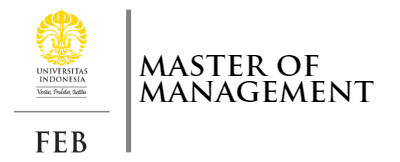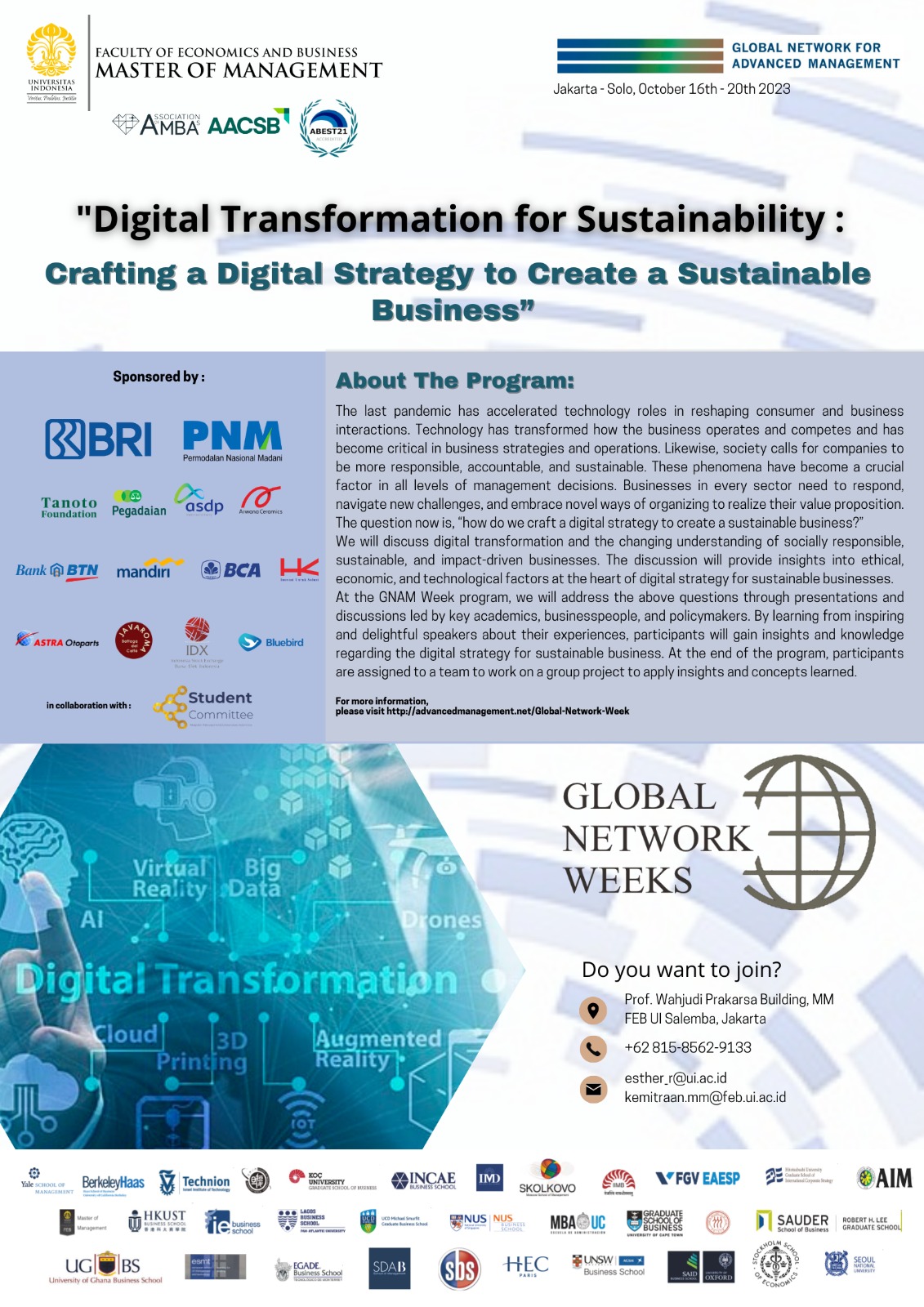GNAM Week Universitas Indonesia October 2023, Day 2, 1st session
PT Pegadaian
On the first session of the second day of GNAM Week 2023, all attendees visited PT Pegadaian to delve into the transformative journey of digitalization in pawning business. The spotlight of this session’s discussion was on a case study of PT Pegadaian, moderated by Ms. Triana Rahajeng Hadiprawoto, Ph.D.
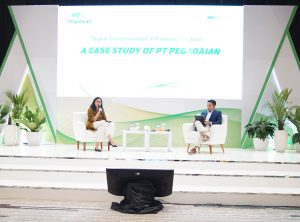
Mr. Sahat Pangabahan Pangaribuan, as the Senior Executive Vice President of Transformation Officer of PT Pegadaian, stated that PT Pegadaian was one of the oldest company in Indonesia, established in 1901 and firstly brought by the Dutch. To this day, pawning business is still the core business model of PT Pegadaian that attracts around 88% of the total customers. Mr. Sahat explained that pawning is actually a simple traditional business model. When people suddenly need fund, they can simply hand their goods and the company will value it and give loan that they need to pay back in several period of time.
For the last 5 years, PT Pegadaian is still growing in a sustainable, healthy way, with almost 15% of outstanding customer growth. Making this old business keep on growing and relevant to today’s generation, PT Pegadaian adjusts to an ambidexterity framework for sustainability to keep on transforming. Along with this, Mr. Sahat stated that the company believes that the ultimate moment to transform is when the company’s in a healthy situation.
By walking through with this framework, PT Pegadaian optimizes the operational and financial performances of their existing core business, the pawning business model, while on the same time continues to find new opportunity growth and implements the transformation beyond their core business to create future new businesses. To sustain this framework, PT Pegadaian is applying the G7 Star Strategy. The first step of this strategy is to grow core by strengthening the core business and keep on scaling it up. Following the first step, the company needs to go further by opening their ecosystem and collaborate with other parties such as banking or fin-tech companies. PT Pegadaian then go together, by sinergizing with BRI as a parent company of the financial inclusion. On the fourth step, the company needs to grab new, by building new capabilities and find new business opportunity. With this, they also need to groom talent and adjust to gen z technology by enhancing IT architecture and enabling a data driven operating model. Lastly, PT Pegadaian need to maintain great culture and GCG, by relaunching culture transformation and implementing a comprehensive ESG framework.

One of the main transformation business model that has been applied by PT Pegadaian is Gadai 4.0 Services, by having Gadai Express or Gadai From Home as one of the approach where people don’t need to come to Pegadaian’s physical outlet for the services, but simply by asking for Pegadaian employees to come or by using Pegadaian Digital Services for them to hand out the goods and get loan. Other than that, a potential business model as the use case exploration of PT Pegadaian is GIDR (Gold Indonesia Republic), in which people can buy crypto with gold as the underlying assets.
Ultimately, the session underscored the profound impact of digital transformation on the pawning business industry, mainly on the case of PT Pegadaian. It emphasized the need for adaptation and innovation to remain relevant in an environment where PT Pegadaian is leading the way into the future of pawning business.
PT Permodalan Nasional Madani
Heading out from the first session, all attendees visited PT Permodalan Nasional Madani to delve into the transformative journey of digitalization for SMEs in increasing financial inclusion. The spotlight of this session’s discussion was on a case study of PT Permodalan Nasional Madani, moderated by Ms. Triana Rahajeng Hadiprawoto, Ph.D.
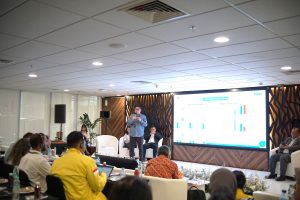
The Director of Operation, Digital and Information Technology of PT Permodalan Nasional Madani, Mr. Sunar Basuki, S.E., M.B.A., CRA., CRP, stated that micro scale businesses have dominated the business structure in Indonesia, with about 63 millions unit. Furthermore, PT Permodalan Nasional Madani set their target markets to the lowest of the bottom of the pyramid, which we usually call as Ultra Micro business, specifically group lending or community based business. The company itself was launched commercially in early 2016 and since then has a vision to become a national leading financial institution for Ultra Micro, Micro, and small businesses by providing empowerment programme, business added values and services.
One of the product feature of PT Permodalan Nasional Madani is called as PNM Mekaar, which is a group-based lending for underprivileged women to have productive loan. The company take the risk and implement the social reengineering, where they create groups and then apply the joint responsibility to make everyone’s responsibilities connected. Each of the groups will be given a field assistant to help along the program, in which there are total of 61.990 field assistants consisting of 92.3% of high school graduate. To this day, PT Permodalan Nasional Madani has women take up around 14.8 million of total customers.
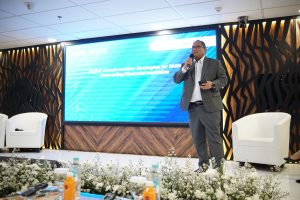
It is known based on the research of technology readiness of Mekaar customers, that the number is still very low. The main cause is that customers still need offline touch and they need their transaction pattern to still be on cash basis. With this fact, PT Permodalan Nasional Madani created Mekaar Digi, in which customers can meet assistant officer of PT Permodalan Nasional Madani by offline, but the rest of the programs still can be held by using the digital platform. The company has a specific target for this year as well, which is to digitalized the group leaders of the joint customer groups by creating Ketua Tumbuh. Along with this program, the group leaders will be assigned as the account officer assistant of PT Permodalan Nasional Madani.
Another digitalisation transformation that has been done by the company is that PT Permodalan Nasional Madani has made their system integrated to BRI and PT Pegadaian, with a program called as Senyum Mobile. With this program, customers can ask for the savings or loaning program of BRI as well as gold savings or pawning program of PT Pegadaian, by just meeting the account officer of PT Permodalan Nasional Madani offline.
One interesting highlight of the speakers’ material today is that other than focusing on financial or operational aspects, PT Permodalan Nasional Madani also focuses on health aspects by holding several programs such as webinar on breast cancer, webinar on nutrition, and health and environment literacy in the form of webinar and talk show series. They also keep on doing their corporate social responsibility by creating Ruang Pintar as an informal study routine program for children from underprivileged family, upskilling program, Madani Enterpreneur Academy, and many other environmental programs. With this, we can conclude that their initiatives encompassing health awareness and social responsibility showcase a holistic vision for improving the lives of those they serve.
In conclusion, PT Permodalan Nasional Madani’s commitment to fostering financial inclusion and digital transformation in support of Indonesia’s micro and small businesses is both inspiring and commendable. PT Permodalan Nasional Madani’s multifaceted efforts underline the broader positive impact a financial institution can have on society, going beyond the realms of traditional banking and truly making a difference in the lives of many.
At Tanoto Foundation
At Tanoto Foundation, we began our last session at 13:45. Participants in GNAM Week were separated into three groups and welcomed on an office tour that lasted about an hour. Each group took turns touring the Tanoto Foundation Impact Gallery on the second floor, hearing a material presentation by SDG Academy Indonesia, and then ascending to the sixth floor to investigate the Jakarta Fashion Hub, where the project aims to support the development of the fashion industry in Indonesia, including facilities specifically designed to support designers, fashion industry players, and related stakeholders in developing their businesses and, of course, creating an ecosystem that supports innovation, creativity, and growth of the fashion industry in the region.
Building Corporate Digital Transformation Infrastructure: Case Study of Asia Pacific Rayon (APR)
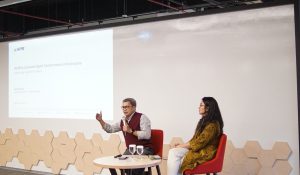
Moderator with Mr. Basrie Kamba, President Director of Asia Pacific Rayon
Mr. Basrie Kamba, as President Director of Asia Pacific Rayon, started with the background that Indonesia imports cotton from China or Australia around 600,000 tons per year, which is a huge amount and has been a bad thing for Indonesian cotton. So, Asia Pacific Rayon focuses on the production of high-quality rayon fibers used in the textile and apparel industries. APR is currently implementing the APR2030 Agenda derived from the Sustainable Development Goals (SDGs), which are national development priorities, with the goal of becoming a responsible and efficient world-class viscose-rayon producer, creating value for Society, Country, Climate, Customer, and Companies. There are 4 main pillars of the APR2030 agenda, positive impact on climate and nature, promoting inclusive prosperity and gender equality, positive impact on climate and nature, promoting inclusive prosperity and gender equality, clean and closed production processes, from fiber to fashion, and accelerating circularity and innovation.
APR is implementing digital transformation in:
- Traceability and transparency in the supply chain,
- Speed of information and rapid change,
- Sustainability in business and operations,
- Disclosure of information related to operational activities,
- Responsible production processes, and
- Implementation of new and renewable
In its history, changes in operational digitalization in the manufacturing process started in 2015 with the fiber intelligent operation center and have continued to the present with spare part optimization. These changes will continue to develop in line with the times as well as in the supply chain management process, which is also implementing optimized warehouses, container yards, and ports, though they are not yet complete on the digital sales and customer platform. By implementing digitalization, APR gains benefits depending on the objectives of the process. As in transparency and traceability manufacturing, it can speed up the work process and also make it effective and efficient in terms of time and productivity. Then the target is about the operational and strategic levels related to HR Management, which will result in ease in making strategic management decisions due to the availability of accurate information related to HR based on databases. Last, the goal is the implementation of renewable energy in unused landfill areas. Since 2020, using solar panels in operation can save or reduce emissions by reducing coal use by 400kg, per MWh.
The conclusion is, that technology is being used to support sustainability in the textile industry, addressing potential opportunities and challenges. APR shows that focusing on doing good and doing right can positively impact companies and future challenges. Collaboration can create a larger net worth textile and a healthier industry for generations. However, AI technology can quickly copy patterns, leading to losses for big names in Indonesian fashion designers. Business owners should consider developing their own strategies to address these issues.
